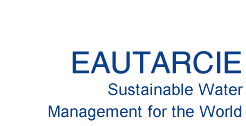
The considerations explained herein about the legal aspects of water utilization must be regarded as a concerned citizen's manifesto on water policies.
The following pages will be useful to water policy advisors and decision-makers, particularly in many parts of Europe and North America, as well as in those regions of the world that may be tempted to reproduce unsustainable supply and sanitation techniques. Arid and semi-arid regions of the world are traditionally and naturally more sensitive to the significance of rainwater harvesting, and it is to be hoped that official policies in these regions will be more in line with this concern: therefore, the considerations herein may (or may not) apply to those regions.
Managing one’s water as per the EAUTARCIE concept is more than a simple technical option: it is a social choice expressing a highly political standpoint. As such, the system’s prime quality is to conduce to a school of responsible management.
The text within this page was first published in French on www.eautarcie.com:
in 2000
The original text has since been adapted and was first published in English on this page at www.eautarcie.org:
2010-04-20
Last update: 2012-01-08


Water Supply Policies
Rainwater Harvesting – An «Uncivic» and Antisocial Practice?
An «Uncivic» Practice
Even though rainwater is an integral part of sustainable water management, it becomes an uncivic activity in the current legal context, notably in Western Europe, and almost certainly in many other countries of the world.
When you harvest rainwater while at the same time discharging your wastewater into the sewers, you no longer participate in the collective effort of water supply (i.e. doing your civic duty) while continuing to pollute. Despite official rhetoric on the need to save water, neither regulating bodies or private water distribution companies will recommend rainwater harvesting without reservation or some ulterior motives. For the former, this may involve less fiscal revenues, for the latter it means less sales turnover.
Imagine – the user will come to discover rainwater harvesting’s advantages, contributing to this industry’s growth, in spite of official warnings. With reduced mains water consumption, the price of water will go up, making rainwater even more attractive. You thus enter into an escalation spiral. To maintain fiscal revenues, regulating bodies will thus be tempted to tax rainwater, thereby taxing a practice that helps preserve our resources and reduce our pollution. Rainwater taxation constitutes a logic that can only be part of an absurd legal system that makes you pay for your water consumption instead of making you pay for the pollution you generate.
An «Antisocial Practice»
As suggested above, generalized rainwater use will reduce mains water consumption, which will lead to a higher price for water, making rainwater even more appealing. In so doing, the less affluent members of the population, unable to finance cisterns and pumps for a rainwater harvesting system will be the ones who will pay the higher price. By extension, using rainwater may be regarded as an antisocial act.
From the moment legislators make you pay for water instead of the pollution you discharge into it, water management enters into a catch-22 whereby this vital resource inevitably becomes a negotiable commodity. This legalistic approach is also an aggression against the environment. A strong political will is required to take the notion of sustainable water management seriously and get us out of this cycle. It’s technically feasible. See paragraphs on the polluter-pays principle.
Absurd Legislation
The uncivic and antisocial character of rainwater harvesting is the result of absurd legislation. Nevertheless, you can get out of this situation by really deciding to remove water production, distribution and treatment from the realm of commodities.
In Belgium’s Walloon region, the 1st significant step in this direction would be to dismantle the SPGE (Société Publique de Gestion de l’Eau or «Public Corporation on Water Management»). The SPGE is only «public» in so far as the funding for this billion-dollar money-pit comes from government funds. The real technical administration is in the hands of private corporate managers having capital investments in the SPGE. The SPGE exists only to guarantee the solvency of these corporations’ «clients» by drawing generously from the government treasury. Similar such situations occur in many other regions of Europe.
The 2nd step would consist in returning the responsibility of water management (supply + sanitation) to municipalities or communal authorities. In Belgium’s case, this would in fact reinstate legal provisions already demanded within the Constitution. In small cities and rural areas, water supply and distribution should also return to regional municipalities, thereby remaining a true public service provided by municipal bodies. Except for large cities, this would result in a substantial reduction of the price of water. About 50% of the price paid for water in smaller cities and rural areas in fact covers administration costs. The bigger a corporation becomes, the more its administrative costs increase. This is a well know fact (of bureaucracy).
The saying «Walloons don’t receive equal treatment on their water bill» leads to unreasonable demands that are incompatible with a sustainable management approach. The price of water is determined by a multitude of factors that vary from one municipality to the next. If we are to efficiently protect our water resources, it is logical to charge a higher price for water in those municipalities where water is over-exploited. You should even go so far as to tax incrementally to penalize wastage. In other municipalities having plentiful water and sufficient fiscal resources, water could be provided free of charge, up to a certain volume per connection, although here again, you would need incremental taxation to reduce wastage.
Once water distribution companies become true public services, water taxation no longer answers to a commodity approach. You can fix the price according to other considerations: ecological, technical and in respect of local social policies. In this legal context, authorities can more freely recommend rainwater harvesting expansion without fear of reducing their fiscal revenues or other considerations such as the viability of some corporate water supply enterprise.
The 3rd important step would be to rigorously apply the polluter-pays principle. There should be no taxing of water, such taxation being immoral since water is a primal need. In addition, water taxation violates Europe’s polluter-pays principle. By taxing the discharge of pollution in water, you could put an end to the present deadlock. Wastewater purification costs should be paid by taxation of those consumer products, which by their inherent use, end up being discharged in water.
In any case, once you remove water management responsibility from multinational corporations’ hands, the inherent costs of wastewater treatment melt like snow in the sun. More widespread application of the Ecosain concept could remove two-thirds to three-quarters of the population from regions served by sewerage networks. In areas where individual wastewater treatment dominates, the techniques proposed within these pages could reduce the inherent costs of sanitation to a mere fraction. In so doing, you would also eliminate water pollution from the residential sector.
Steering Away from Water-commodity Policies
Parallel to removing tax from water, you would need to implement a policy that decentralizes water supply and distribution providers.
Forty years ago in Wallonia, there were 300 small municipal water providers distributing good-quality water free of charge or at a low price. Their management costs were integrated into municipal service costs. Water supply was a service provided by municipalities to their citizens, without any claim to profitability. The grouping of these small providers into large corporations has, in many instances, contributed to a lesser quality water (in spite of greater monitoring and controls), and in all cases, led to an increase in overhead costs. These administrative costs now represent about half of the price of water billed to the consumer.
Large municipal corporations must show profitability. Overhead costs being fixed, any reduction in mains water consumption automatically leads to a higher price for water. Add to this the absurd inclusion of an added tax to fund wastewater treatment.
To steer water away from the commodity approach, we must:
- Dismantle large corporations and entrust water supply to municipalities (except in large cities). Water supply must become again a true public service, without any claim to profitability;
- Fix the price of water with respect to criteria that are specific to each municipality;
- Stop taxing water;
- Tax cleaning products at their point of purchase;
- Grant subsidies and fiscal rebates on the purchase of rainwater harvesting equipment (cisterns, pumps, filters);
- Finance wastewater treatment in part with revenues from taxation of cleaning products. Centralized sewerage should become a service that is billed to the users only. Instead of charging the «true cost of water», start looking into charging the «true cost of pollution»;
- Tax those corporations that manage sanitation plants on the basis of the annual pollutant load that is discharged into the environment (including treated water and sewage sludge), for each set-up. Integrate this tax within the wastewater treatment charge to the users. The billing must be tied to the number of inhabitant-equivalent. Any wastewater discharge into a river that comes from an individual treatment system must also be taxed on the basis of the pollutant load;
- To calculate this tax, carry out environmental life-cycle assessments for each type of wastewater treatment system, taking into account the receiving milieu (river or ground) and the sludge produced. In each assessment, account for all energy expended for wastewater treatment, the annual load of mineralized nitrogen (nitrates) produced, and the biological value of organic matter that has been destroyed by wastewater treatment;
- Do not authorize the discharge of treated water into rivers unless it is clearly demonstrated that dispersal into the ground or phytoremediation through wetlands is technically or financially unfeasible;
- Implement a fixed inhabitant-equivalent tax on the «faecal load» for those who use a flush toilet. Dry toilet users would be exonerated from this tax.
A return to smaller municipal water providers will not, as some may think constitute a major problem for municipalities. Fixed overhead and maintenance costs would become part of the inherent overhead costs for the various municipal services provided. Depending on the abundance or rarity of the water resource, and considering social imperatives, each municipality would develop its own price policy, penalizing wastage at varying degrees.
You could thenceforth recommend water saving measures such as rainwater harvesting, without restraint. In rural and peri-urban areas, precipitation could cover at least 80% of domestic water demand. Generalized use of dry toilets would help reduce household water consumption by 25 to 35%. With this option, centralized distribution would only provide a back-up in case of water shortage due to a drought period. Its contribution would not exceed 15 to 20% of annual domestic needs. Water thus saved within our collective water reserves would then be available for other uses, notably agricultural. The positive environmental impact would be enormous.
The above measures would quickly eliminate our water problems, at least in our cities and municipalities. Generalized taxation of pollution would steer our technical choices towards pollution prevention techniques that go to the root of the problem.
Because pollution is inherently generated within a centralized sewerage framework, living in such neighbourhoods would become more costly. This would lead to a progressive decrease in centralized sewered zones and an expansion of ecological sanitation zones. The expansion of this new concept would considerably reduce the inherent costs of wastewater management. This would eventually lead to the removal of taxes on cleaning products since these don’t pose an environmental risk when grey water is infiltrated into the ground.
The Polluter Pays Principle
European water legislation is based on a misguided concept that taxes water consumption instead of water pollution. Legislation that purposes to protect the environment must rigorously apply the polluter-pays principle. There is really no other efficient means to «motivate» taxpayers towards actions that reduce pollution at the source. Without a citizen’s active participation, all policies on environmental protection are doomed to failure.
While authorities include a tax towards pure water (i.e. for wastewater treatment) within the price of potable water supply, there is absolutely no correlation between the amount of tax paid and the pollution generated. In addition, the act of polluting is completely removed from its fiscal penalty. In such a context, when you water your lawn or your garden, you pay tax on purified water without necessarily polluting the environment. On the other hand, the person who uses excessive quantities of cleaning products for laundering, dishwashing, etc. while using well water or harvested rainwater will generate substantial pollution while paying absolutely no tax. With current taxation practices, nothing incites consumers to reduce their pollution.
When you make people pay for their water consumption, it becomes a commodity. The profits that can be drawn from this merchandise will whet the appetite of a business sector whose interest will lie in water shortages, to maintain or even increase their turnover. Instead of putting in place truly sustainable management practices, they will encourage centralized purification and sanitation techniques with the hidden but quite real purpose of perpetuating our water problems.
Knowing that simple and inexpensive alternatives exist, such as decentralized water management systems, one can seriously worry on the extent of the pending environmental and human disaster that can result from the water commodity approach. By steering tax legislation towards pollution and polluters, by putting forth pollution prevention techniques, and by propounding decentralized water management, the world could solve its water problems within two generations.
No «International Water Charter», no «Water Manifesto» and no solemn declaration of solidarity can replace legislation that promotes truly sustainable management techniques. Why isn’t there a political will to favour these techniques? Because there is enormous pressure on political decision-makers, coming from specific industrial and business interests.
University scientists and the more media-exposed environmentalist organizations also share in the blame for this misguided heritage. The best scientists are aware of the problem, but prefer abstaining from the debate, either for opportunistic or career-minded reasons. Environmentalists are also opportunistic, yet they remain closed to the ideas propounded on this website, either due to their ignorance, or to maintain the government subsidies they are allotted.
And yet in the residential sector, it would be just as simple to have people pay for their pollution instead of having them pay for their water. Taxation towards pure water should be incorporated in the purchase price of those products which, after use, are discharged into water.
The average European household uses 3 to 5 times too much detergent for cleaning. Taxation of soaps, laundry detergents, chlorine bleach, shampoos, dishwashing liquid, etc. would have a more substantial impact on pollution reduction, without spending a single Euro on sanitation plants. You could even refine the strict application of the polluter-pays principle by applying a taxation rate proportional to the environmental harmfulness of each product (including their manufacturing process and use). Thus, fiscal policies could steer the consumer towards more environmentally friendly products. Presently, the opposite occurs, as environmentally friendly products are usually more expensive.




